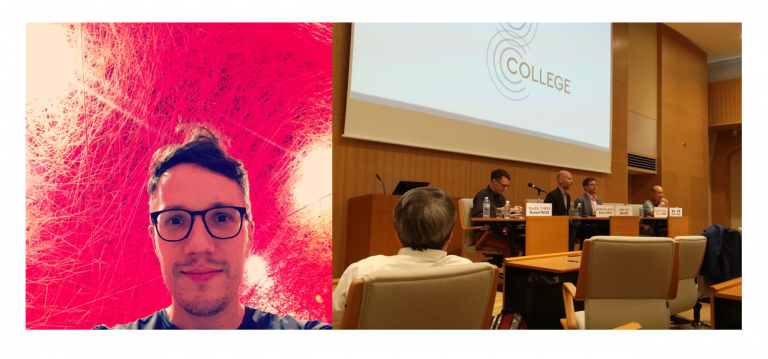Catching up with our Postdocs: Dr Michael Facius
20 September 2019
Since this week is National Postdoc Appreciation Week, we thought it would be great to catch up with some of our Teaching Fellows and Research Associates about what they have been up to over the summer! We spoke to Dr Michael Facius.

You've just returned from a research stay in Japan. Would you tell us a bit about your time there?
The stay was part of my current book project on images and stories about the Early Modern or Edo period that have been circulating in Japan during the last century. The project and trip are funded by the British Academy in the context of the Newton International Fellowship I am holding at UCL right now.
The most tangible purpose of the trip was to participate in various dissemination and networking events. In early August, I went to Kyoto to give a paper on the narrative functions of ruins in the video game Horizon Zero Dawn at the DiGRA games studies conference at Ritsumeikan University. Last weekend, I gave another presentation at the European Association for Japanese Studies conference in Tsukuba on history examinations in Japan.
Earlier this month the University of Tokyo, with which I was affiliated as a visiting research fellow, held a summer school on global history together with their networking partners in Paris, Berlin and Princeton. In this context, I moderated a panel discussion, which was also open to the general public, on the question: "Why do we need global history?"
Apart from these activities, I mainly collected sources and literature on the Early Modern period in public history and continued working on the manuscript for the book. In my spare time, I went to see an absolutely stunning exhibition on the Berlin-based Japanese artist Chiota Chiharu, at which I ended up taking the selfie you see above.
Ruins in video games and history tests? What do these two have in common and what role do they play in your research?
As professional historians we still tend to entertain the notion that academic history has a privileged position from which to one-sidedly judge other ways of engaging with the past. In my book, I try to question the boundaries between academic and public history by understanding them as different forms of "historying" as a verb, as Alun Munslow has proposed it, with their own respective conventions, limits and potentials.
Ruins in games such as Horizon Zero Dawn are embedded in a discourse about ruins that itself has deep historical roots in the Renaissance and at the same time transport their own interesting and non-trivial ideas about historical change. History tests like the Edo Culture and History Examination, which many people in Japan take for pleasure or out of intellectual curiosity, are another interesting genre of engaging the past that combine the classical fact-oriented multiple-choice test with bodily activities of experiencing the past such as visiting historical sites, and imaginative textbook stories about everyday life in that period.
Your Newton Fellowship at UCL will come to end in early 2020. What is coming up next for you?
Before completing my time at the History department, I am going to teach in the MA programs Transnational Studies and Chinese Health and Humanities in the upcoming term. My next stop will be Japan. I will start a position at a new research centre at the University of Tokyo called Tokyo College, where I will finish the manuscript for my current book project and be involved in its various interdisciplinary endeavours and outreach activities.
 Close
Close

